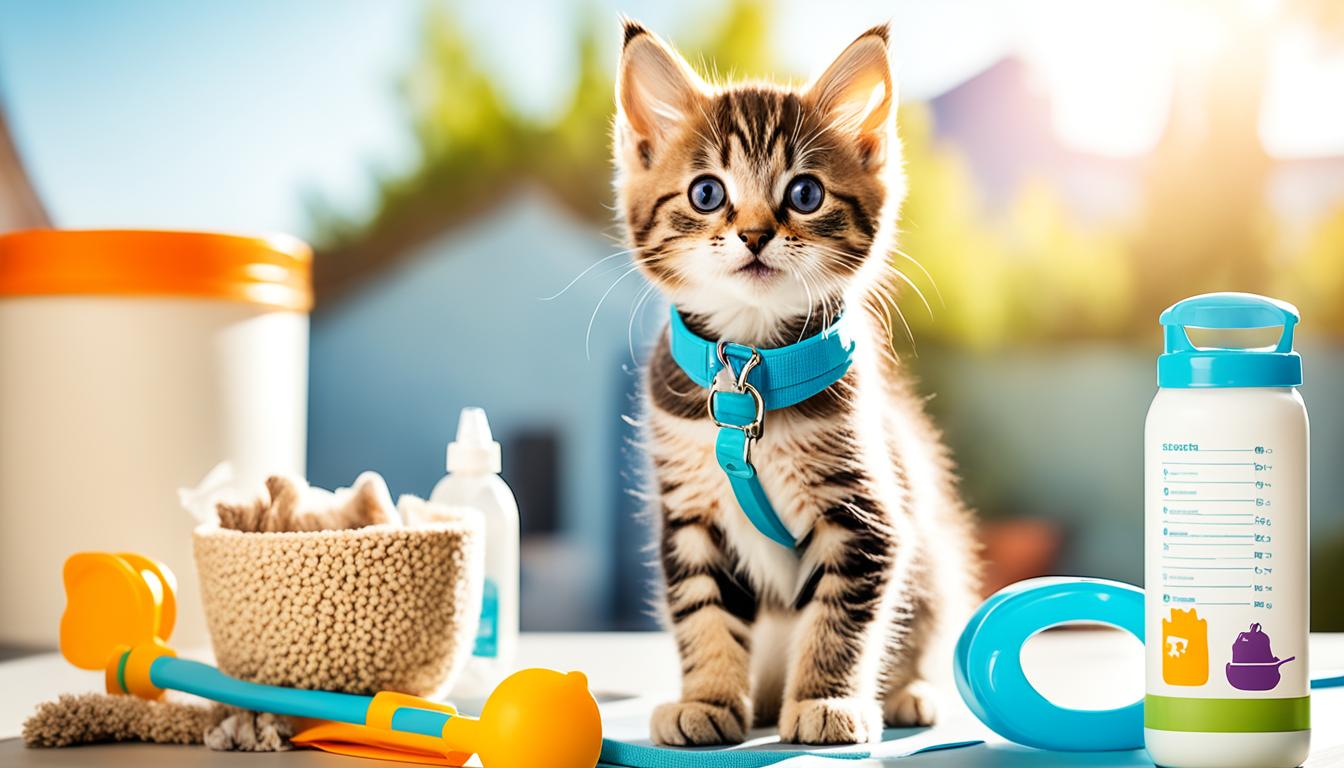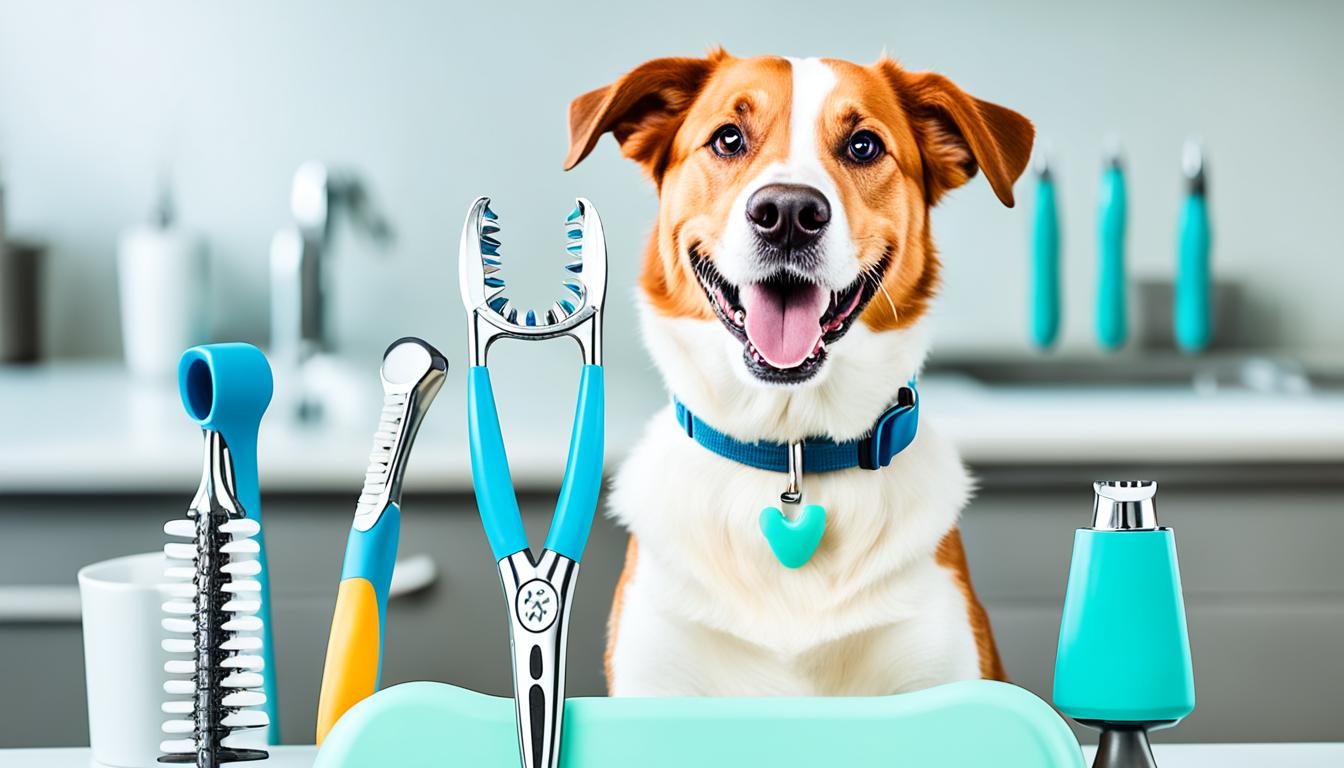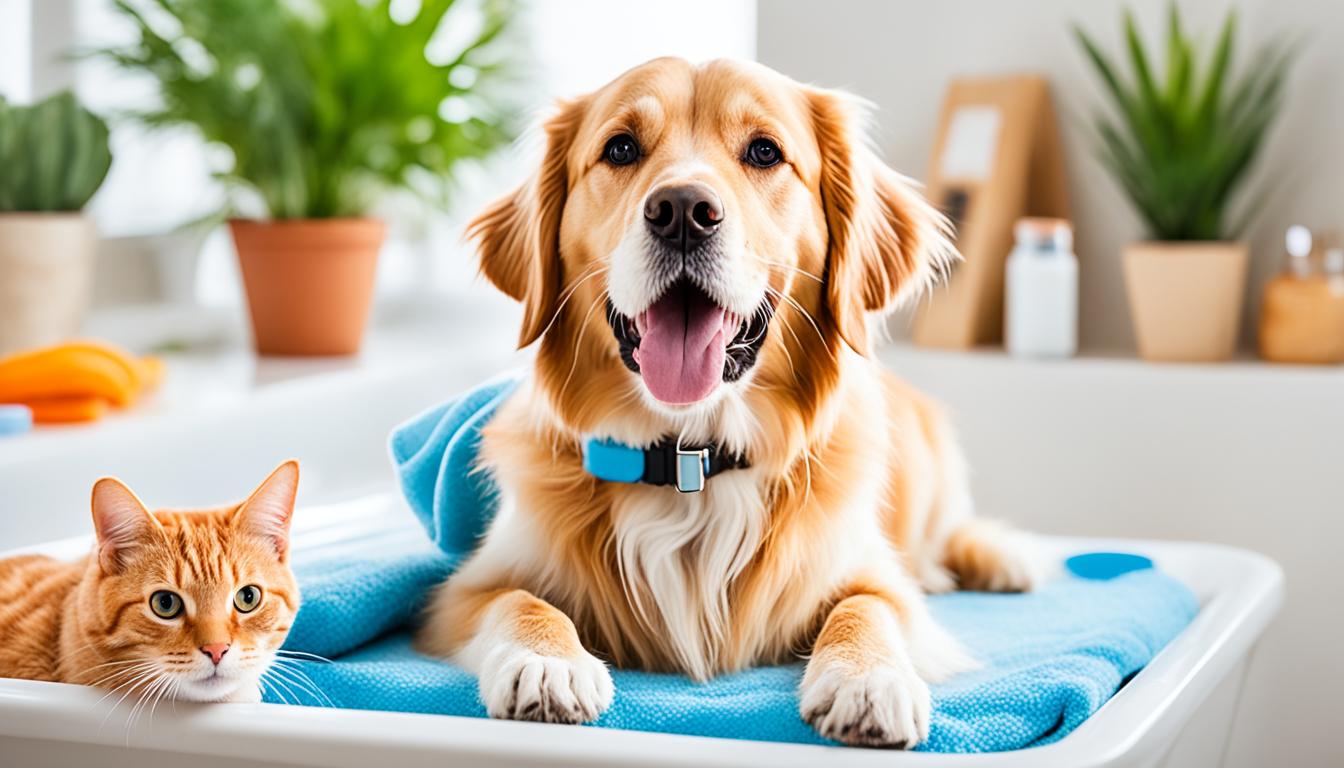As a pet owner, ensuring your furry friend’s well-being is a top priority. Adopting effective pet care tips is crucial for vibrant living. These practices include maintaining a balanced diet and routine veterinary check-ups. They ensure a happier and healthier life for your beloved companion. This guide offers valuable pet health tips for easy implementation in your daily routine, aiding your pet’s well-being.
Understanding your pet’s nutritional needs is fundamental to good health. Malnutrition is a common issue diagnosed by veterinarians, highlighting the importance of proper dietary choices. Regular check-ups and vaccinations are essential, especially for seniors, to prevent conditions like heartworm or periodontal disease. Regular grooming not only keeps the coat lustrous but also aids in early detection of health issues.
Consistency in oral hygiene, such as daily brushing, significantly contributes to your pet’s overall health. Exercise and mental stimulation are also crucial for holistic wellness. We will explore these areas further with effective recommendations to improve both your and your pet’s lives. For more health advice and tips, check out this interesting article about healthy habits for your furry friends at Healthy Sleep Habits.
Key Takeaways
- Understanding your pet’s nutritional needs is crucial for preventing malnutrition.
- Maintaining a healthy weight is essential for your pet’s long-term health.
- Routine check-ups with a veterinarian can help identify health concerns early.
- Daily dental care can prevent a majority of dental diseases in dogs.
- Regular grooming helps ensure a healthy coat and can identify health issues.
- Mental stimulation and exercise are key components of your pet’s well-being.
Understanding Your Pet’s Nutritional Needs
Ensuring your pet’s nutritional needs is crucial for their health. A balanced diet is packed with essential nutrients that support bodily functions and enhance well-being. By adhering to pet nutrition guidelines, you can avoid malnutrition, a common health issue identified by veterinarians. Dietary adjustments should mirror the unique needs across different life stages.
Importance of a Balanced Diet
A balanced diet for pets includes proteins, fats, carbohydrates, vitamins, minerals, and water. Young pets need diets rich in proteins, fats, calcium, and phosphorus to aid their rapid growth and development. Puppies, for example, should consume food with 25 to 30% protein, depending on their breed.
Adult pets require a balanced mix to maintain a healthy weight and receive “maintenance” energy. For older pets, diets should be lower in calories but still rich in protein to support muscle mass and joint health. Omega-3 fatty acids can also boost cognitive function, enhancing their quality of life.
Consulting Your Veterinarian for Food Recommendations
Consulting your veterinarian for food recommendations ensures tailored dietary advice for your pet’s specific needs. Dogs and cats have distinct nutritional requirements, making it vital to follow proper pet nutrition guidelines. A vet can pinpoint food allergies, such as itchy skin or digestive issues, aiding in informed dietary decisions.
Feeding Practices for Different Life Stages
Adapting feeding practices to your pet’s life stages is essential. Puppies initially receive complete nutrition from their mother’s milk, then require up to twice the energy of adult dogs. Small breeds reach adult weight in nine to twelve months, requiring careful diet management during this period. As pets age, dietary adjustments become crucial to keep them healthy and active.
Pet Care Tips for Maintaining a Healthy Weight
Ensuring your pet maintains a healthy weight is vital for their overall health. In the U.S., about 56 percent of dogs and 60 percent of cats are overweight or obese. These conditions pose significant health risks, highlighting the importance of proactive weight management. By adopting various pet health tips, you can confidently manage your pet’s weight.
Understanding Body Condition Scoring (BCS)
Body Condition Scoring (BCS) is a valuable tool for assessing your pet’s weight status. It evaluates body shape and fat distribution. Consulting with your vet about the BCS system offers insights into your pet’s diet and exercise needs.
Consequences of Obesity in Pets
Obesity severely impacts your pet’s health, potentially causing diabetes, heart disease, and arthritis. Overweight pets often experience a lower quality of life and shorter lifespan. Early intervention in weight management is crucial to prevent these issues.
Creating a Weight Management Plan with Your Vet
Collaborating with your vet to create a personalized weight management plan is the first step. Regular check-ups are vital for discussing tailored weight-loss strategies. Utilizing food guides and measuring portions helps avoid overfeeding. A food diary can identify patterns of overfeeding, and involving the whole family supports your pet’s weight maintenance.
Alongside dietary changes, regular exercise is crucial. Rewarding your pet with activities or affection instead of treats motivates them without adding calories. For more tips on keeping your pet at a healthy weight, check out this resource.
Essential Preventive Health Care Measures
Proactive steps are key to your pet’s health. Regular veterinary check-ups are vital, helping to spot health issues early. Keeping up with vaccinations is also crucial to shield your pets from infectious diseases that could be severe or fatal.
Regular Check-Ups with Your Veterinarian
Regular vet visits ensure your pet gets a comprehensive health check. These visits should include physical exams, dental checks, and blood tests. Blood tests can signal health problems early, allowing for timely action. Healthy pets should see the vet at least once a year, possibly twice, for ongoing health care.
Vaccination Schedules for Dogs and Cats
Vaccines are a cornerstone of preventive health care. Core vaccines shield pets against severe diseases like rabies and parvo in dogs, and panleukopenia in cats. It’s crucial to tailor vaccination schedules to your pet’s lifestyle, age, and risk factors. Following vet advice keeps your pet safe from various health risks.
Heartworm and Flea Prevention Strategies
Heartworm disease is preventable with the right medication, making it essential to consult with your vet. Year-round heartworm prevention is often advised, along with treatments for fleas and ticks. Fleas are the most common pet parasites, while ticks can carry serious diseases like Lyme disease. Vigilance and consistent preventive actions are key to your pet’s health and safety.

Daily Dental Care for Your Pet
Keeping your pet’s dental health in check is vital for their overall health. Regular brushing and dental treats can significantly cut down the risk of dental diseases. These diseases can lead to more serious health issues later on. By age three, many pets already show signs of dental disease. Simple pet health tips like regular brushing and dental chews can help manage plaque buildup, ensuring your pet stays healthy and happy.
The Benefits of Oral Hygiene
Good oral hygiene offers numerous benefits for your pet. It prevents periodontal disease and improves digestion, making their breath fresher. Understanding oral health’s importance helps you incorporate effective pet behavior tips into your routine. Regular dental check-ups are crucial for monitoring your pet’s dental health and addressing issues early.
Effective Brushing Techniques
Brushing your pet’s teeth is key to maintaining their oral health. Aim for brushing at least three times a week with pet-specific toothbrushes and toothpaste. Start by introducing the process slowly to make it a positive experience. Getting your pet used to the taste of pet toothpaste will ease their discomfort during brushing.
Dental Treats and Chews as Preventative Measures
Dental treats and chews can enhance your brushing efforts, targeting plaque and tartar that brushing might miss. Choose dental products designed for pets. Adding these to your pet’s daily routine not only boosts their oral health but also provides a fun chewing activity. Exploring more pet health tips can help you improve your pet’s wellness even more.

Pet Grooming Advice for a Healthy Coat
Regular grooming is crucial for maintaining your pet’s coat health and preventing issues. It enhances their appearance and allows you to monitor their health. Spotting potential problems during grooming makes it a key part of animal care information.
The Importance of Regular Grooming
The American Society for the Prevention of Cruelty to Animals (ASPCA) suggests bathing dogs every three months. However, some breeds, like those that spend a lot of time outdoors, may need baths more often to manage dirt and skin issues. Dogs with loose facial skin, such as Shar Peis and Pugs, require extra care to prevent bacterial irritation.
Identifying Health Issues during Grooming Sessions
Grooming your dog regularly allows for a thorough check of their coat and skin. Be alert for signs like excessive scratching, redness, or hair loss, which could signal health problems. Various factors, including parasites, allergies, or metabolic issues, can cause skin problems. If you notice anything unusual, it’s vital to consult a vet to keep your dog healthy.
Products to Use for Grooming
Choosing the right grooming products is key. The products should suit your pet’s coat type. For instance, smooth-coated breeds like Chihuahuas and Boxers need brushing once a week, while long-haired breeds require daily grooming to prevent mats. With the right pet grooming advice, you can create a routine that meets your pet’s needs, ensuring their comfort and health.

Exercise and Play: Keys to Pet Wellness
Regular exercise and play are crucial for your pet’s wellness. They are key to keeping their physical health and mental well-being in check. Dogs and cats alike require a blend of physical activity and mental stimulation to flourish. Knowing the right types of exercise can significantly improve their life quality.
Types of Exercise for Your Pet’s Health
Dogs benefit from activities like dog walks, playdates, and games of fetch. Cats, however, enjoy play with toys such as feathers, balls, or laser pointers. Exercise helps prevent obesity, a condition affecting 56 percent of dogs and 50 percent of cats. It also strengthens muscles, tendons, and bones, ensuring your pet stays happy and healthy.
Mental Stimulation through Play
Playtime is essential for your pet’s mental health. Toys and games that challenge them or require problem-solving skills can prevent behavioral problems. Positive play experiences strengthen the bond with your pet, making them happier and less anxious or depressed.
Recognizing Your Pet’s Energy Levels
Each pet has distinct energy levels influenced by their age and breed. By observing their behavior, you can tailor activities to match their energy. Dogs generally need more intense exercise than cats. Knowing these differences helps you provide the right pet wellness advice and health tips, keeping your pets lively.

Understanding Pet Behavior for Better Care
Understanding your pet’s behavior significantly improves the care you provide. Issues like aggression, separation anxiety, and house soiling are common. These problems often stem from stress or environmental factors. It’s essential to identify and address these issues effectively. By implementing pet behavior tips, you can create a calmer, more enjoyable relationship with your pet.
Common Behavioral Issues and Their Impacts
Many pets exhibit aggressive behavior due to fear or pain. This can manifest as growling, hissing, or biting when they feel threatened. House soiling is another common issue, with differences between marking and actual soiling behaviors. Pets may also show separation anxiety, leading to destructive behavior, excessive vocalizing, and house soiling when left alone.
Strategies to Encourage Positive Behaviors
An enriched environment is crucial for addressing behavioral challenges. Activities that stimulate their senses, along with enrichment items like scratching posts for cats and chew toys for dogs, promote positive behaviors. Positive reinforcement to teach alternative behaviors can lead to lasting change. Regular training sessions improve manners and strengthen the bond between you and your pet.
Recognizing Signs of Stress and Anxiety
It’s important to recognize signs of stress in your pet. Happy dogs typically exhibit relaxed postures and wagging tails, while content cats knead and purr. Distressed pets may show signs like excessive panting, hiding, or cowering. Providing safe hiding places and regular exercise can help alleviate stress, making your pet feel secure. Observing and recording these behaviors during annual vet wellness visits can lead to effective strategies tailored to your pet’s needs.

Choosing the Right Supplements for Your Pet
Choosing the right supplements can greatly enhance your pet’s health by filling nutritional gaps in their diet. Many pets, even those with balanced diets, may lack certain essential nutrients. Supplements designed for specific needs can aid in digestion, boost immunity, and support muscle growth. It’s vital to understand when and how to incorporate these supplements.
When Supplements Might Be Necessary
Not every pet needs supplements, but certain situations make them beneficial. For example, older pets may benefit from glucosamine and omega fatty acids for joint support. Pets with low energy might improve with Vitamin B or probiotics for better digestion. These pet health tips come from veterinarians to boost overall health.
Consulting Your Vet for Recommendations
Always consult your veterinarian before adding supplements to your pet’s routine. They can evaluate your pet’s diet and health needs to ensure supplements are suitable. Products like the Pet Honesty Wellness Cat Pack offer digestive and immune support. These veterinary recommendations help avoid the risks of random product selection, ensuring safety and effectiveness.
Quality Matters: Understanding Supplement Ingredients
Ensuring the quality of supplements is crucial. Seek products that have been tested by third parties and carry a lot number on their packaging. Clear ingredient lists reveal the quality and origin of the components. Supplements with glucosamine, probiotics, and antioxidants can help with joint health and immunity. Watching for signs of improvement, like a shinier coat or increased mobility, can show the supplements are working.
Conclusion
Ensuring your pet’s health requires a holistic approach. This includes nutrition, preventive care, regular exercise, grooming, and understanding their behavior. By following these vital pet care tips, you can greatly improve your pet’s well-being. This, in turn, enriches both their lives and yours.
The significance of a balanced diet for pets cannot be overstated. Research shows that proper nutrition can extend a pet’s life by up to 15%. Moreover, with 56% of dogs in the U.S. being overweight or obese, exercise is essential for their health. Establishing a routine that suits your pet’s needs helps you bond and keeps them active and mentally stimulated.
This guide is your blueprint for enhancing your pet’s health. It covers dental care, vaccinations, and behavior understanding. Consistent efforts in these areas are crucial. For further insights on pet care, visit this informative link. Every small step you take contributes to a rewarding companionship. It ensures your pet enjoys a life full of happiness and health.
FAQ
What are some essential pet care tips for a healthy pet?
How can I determine my pet’s nutritional needs?
What are the consequences of obesity in pets?
How often should I take my pet for veterinary check-ups?
Why is dental care important for my pet?
What should I consider when grooming my pet?
How much exercise does my pet need?
What signs indicate my pet might be stressed or anxious?
Are supplements necessary for my pet?
Source Links
- 8 Tips for a Healthy Dog – https://www.petmd.com/dog/general-health/tips-for-a-healthy-dog
- Preventive Health Care For Dogs – https://www.ingleside.com/services/dogs/preventive-care-dog-health
- Dog Nutrition Tips – https://www.aspca.org/pet-care/dog-care/dog-nutrition-tips
- Understanding Your Pet’s Nutritional Needs – Pet Resorts Australia – https://www.petresortsaustralia.com/understanding-your-pets-nutritional-needs/
- Keeping Your Pet at a Healthy Weight – Pet Food Institute – https://www.petfoodinstitute.org/keeping-your-pet-at-a-healthy-weight/
- Tips for Maintaining Your Pet at a Healthy Weight – Vet In Lebanon | Lebanon Animal Hospital – https://lebanonanimalhospital.com/tips-for-maintaining-your-pet-at-a-healthy-weight/
- Why routine preventative care for your pet is essential – https://www.animalhumanesociety.org/resource/why-routine-preventative-care-your-pet-essential
- 5 Important Preventive Health Care Measures | Goodwin Animal Hospital at Atlanta Highway – https://www.goodwinanimalhospitalatlantahighway.com/blog/5-important-preventive-health-care-measures
- Preventive Health Care Guidelines for Dogs | VCA Animal Hospitals – https://vcahospitals.com/know-your-pet/preventive-health-care-guidelines-for-dogs
- Pet dental care – https://www.avma.org/resources-tools/pet-owners/petcare/pet-dental-care
- Dental Care for Pets: Why It Matters and What It Costs – https://www.carecredit.com/well-u/pet-care/pet-dental-health/
- 5 Simple Steps to Support Your Pet’s Dental Health – https://www.livermorefamilypet.com/services/blog/5-simple-steps-support-your-pets-dental-health
- Dog Grooming Tips – https://www.aspca.org/pet-care/dog-care/dog-grooming-tips
- Pet Grooming 101: Maintaining a Healthy Coat for Your Dog – NutriSource Pet Foods – https://nutrisourcepetfoods.com/blog/pet-parents/pet-grooming-101-maintaining-a-healthy-coat-for-your-dog/
- Pet Wellness Month: 8 Ways to Ensure Your Pet is Living Their Best Life – https://www.advancedanimalcaremp.com/services/blog/pet-wellness-month-8-ways-ensure-your-pet-living-their-best-life
- The Keys to Dog Wellness in Honor of Pet Wellness Month – https://www.7hillsvet.com/services/dogs/blog/keys-dog-wellness-honor-pet-wellness-month
- Understanding Pet Behavior | ASPCA Pet Health Insurance – https://www.aspcapetinsurance.com/behavior-issues/
- Understanding Animal Behavior: Key Insights for Pet Owners | Brawley Animal Hospital – https://brawleyanimal.com/understanding-animal-behavior/
- Understanding Your Dog’s Behaviour | RSPCA – RSPCA – rspca.org.uk – https://www.rspca.org.uk/adviceandwelfare/pets/dogs/behaviour
- Choosing the Right Supplements for Your Pet – https://www.pethonesty.com/blogs/blog/choosing-the-right-supplements-for-your-pet
- The Ultimate Guide to Choosing the Right Supplements for Your Pet – My Pet Naturally – https://mypetnaturally.com/right-supplements-for-your-pet/
- Top Pet Care Tips for a Happy and Healthy Companion | Animed Pet Hospital – https://animedpethospital.com/top-pet-care-tips-for-a-happy-and-healthy-companion/
- All about taking care of your dog: 10 basic tips – Smile4pet – https://smile4pet.com/dog-care-10-tips/


